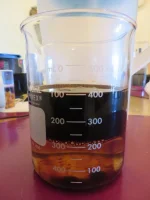- Joined
- Oct 28, 2014
- Messages
- 1,187
I'll make this simple and straightforward: I don't believe you. I'm not calling you a liar, but I'm thoroughly convinced you're mistaken. Now, since I'm not a scientist nor an engineer, I'd call myself a country boy with a little common sense, here's what I challenge you to do: Do your "turkey baster" in your reservoir, make yourself happy, and bleed one brake (anywhere). Just bleed a little dark fluid, a 7ml syringe is enough. All you really need is one good drop. Keep the fluid you bled for reference in a tightly sealed container. Then drive the vehicle for 6 months or however long YOU think it will take for "Brownian motion" to take place, then resample the same brake as you did when you changed the fluid in MC. Post your results, and back up your results with test strip photographs. PM me your address and I will even mail you a few Phoenix Test strips I have on hand, so it will cost you zero. https://www.amazon.com/Phoenix-Syst...rds=phoenix+test+strips&qid=1609362973&sr=8-2 Prove that you're right?The fluids mix fully. Brownian motion.
If you do the reservoir, you will drop a 4% (water content) system to 2%, do it twice and you drop to 1%. It's the same as a partial drain/fill in any system, really. It's tested, and works. You can demonstrate this yourself in your driveway with calcium hydride strips or test pens. Over time (and it's not a lot), the water content in the calipers will equal the content in the reservoir.
No hard feelings; I wish you Happy New Year sir.

